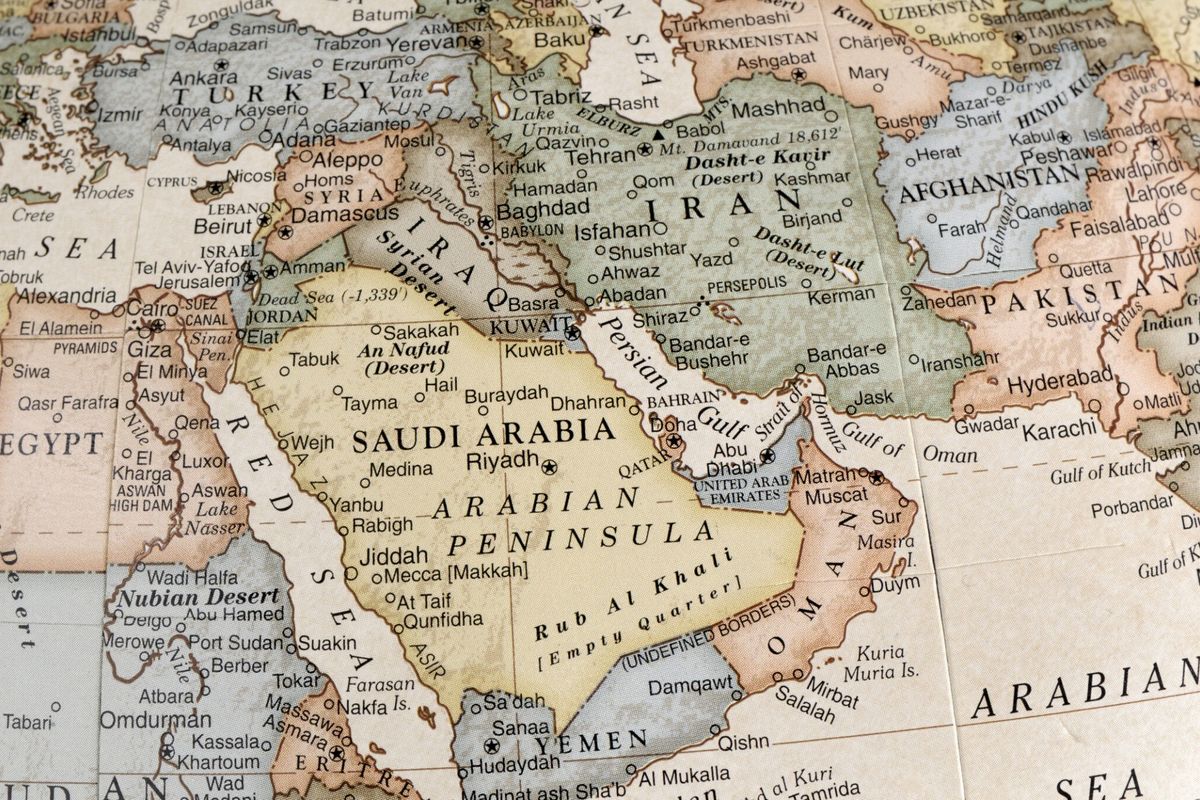The failure of the recent Gulf Cooperation Council 2017 summit to resolve the six-month long crisis that pits Qatar against Saudi Arabia, the United Arab Emirates and Bahrain obscured a little-known outcome of the meeting—that the council at least agreed on several mechanisms to move forward. In the end, the summit only took place on the condition that the crisis was not on the agenda, which was how the Kuwaiti hosts managed to convene it in the first place.
Saudi King Salman bin Abdulaziz Al Saud, along with the heads of state of Bahrain and the UAE, decided at the last minute not to attend the Dec. 5-6 summit in Kuwait. Their decision, I’m told by a top official, was spurred by concern that Qatari Emir Sheikh Tamim bin Hamad Al Thani would use a public forum, which likely would have been covered live on GCC state television during the summit, for grandstanding purposes against his fellow monarchs. This, along with an apparent desire not to have the crisis between the leaders spill into the public nor to negotiate in public or through competing state media outlets, also were factors, according to the official.
The crisis in Gulf relations erupted on May 24, when the official Qatar News Agency (QNA) was hacked and quoted Emir Tamim in a fake statement, saying that Iran is an “Islamic power” and that Qatar enjoys “good” relations with Israel. The statement also quoted the emir calling Hamas “the legitimate representative of the Palestinian people,” as well as saying that Qatar had “strong relations” with Iran and the United States. U.S. officials have since attributed the hack to the UAE, a charge that Abu Dhabi denies.
Bahrain, Saudi Arabia, UAE and Egypt imposed a blockade on Qatar on June 5, and the crisis has evolved since then into a GCC media war where the feuding parties have been lobbing alternate facts, fake news and innuendo at each another. The propaganda war quickly reached Washington, making it increasingly difficult to distinguish between fact and fiction, as advocacy analysis by U.S. scholars entered the fray.
Given these dynamics, it was not surprising that Gulf observers quickly concluded that the GCC was on life-support when it failed to resolve the Qatar dispute. Adding to this narrative was the fact that Emir Tamim, along with his Kuwaiti counterpart and summit host Sheikh Sabah Al Ahmed Al Jaber Al Sabah were the only two heads of state to attend the meeting. The remaining GCC monarchs sent lower-ranking officials, which was perceived as a snub to Kuwait.
Ahead of the Summit, as I wrote in a previous analysis for The Cipher Brief, it was expected that Saudi King Salman would attend, along with Bahraini Crown Prince Salman and the ruler of Dubai, Mohammed bin Rashid Al Maktoum. Instead, Saudi Arabia sent Foreign Minister Adel al-Jubair; Bahrain sent Deputy Prime Minister Muhammad bin Mubarak Al Khalifa; and the UAE dispatched its minister of state for foreign affairs, Anwar Mohammed Gargash.
Seeking Solutions
Kuwait’s Sheikh Sabah sought to address the concerns by assuring the monarchs of Bahrain, the UAE and Saudi Arabia that Emir Tamim would not use the occasion for a public pronouncement on the crisis. But those assurances apparently were not enough to convince the three to attend.
Oman, which has remained neutral throughout the GCC crisis, sent Deputy Prime Minister Sayyid Fahad bin Mahmoud al-Said. At least his attendance in place of Sultan Qaboos al-Said should not be considered a snub, as he consistently represents Muscat at GCC summits.
It is unclear whether the discussions of what Tamim would say during a public forum—or whether he would issue an official apology, as had been suggested by Saudi state media—led to the collapse of the talks during the GCC foreign ministers’ meeting the day before the summit. Uncertainty over what to expect from Tamim, coupled with renewed demands that Doha sever diplomatic relations with Iran in exchange for resolving the crisis, could help explain why Qatar’s top diplomat, Mohammed bin Abdulrahman Al-Thani, chose not to attend a pre-scheduled luncheon with his Saudi and Omani counterparts and instead returned to Doha to brief Tamim on the talks.
Another sticking point is that the Bahrain, Saudi Arabia and the UAE have insisted that Egypt also should be part of the reconciliation process, even if it is not a GCC member. This stance, however, has been rejected by Washington, which says and it wants the Gulf nations to resolve the standoff themselves.
Given that Saudi Arabia, the UAE and Bahrain did not consider the summit to be the proper venue to address the crisis, it’s notable that the GCC, including Qatar, agreed to the following mechanisms moving forward:
- Kuwait would continue mediation to solve the crisis;
- The crisis would be separated from continuing efforts to enhance GCC integration, including in defense, economic and counter-terrorism cooperation.
- Special attention would be place on strengthening strategic partnerships that the GCC has developed in recent years, including with the U.S., the U.K., France, the EU and China, and on implementing joint plans of action previously agreed with a number of other partners.
Loaded Agenda: Terrorism, Iran, Somalia, Libya
Furthermore, even with the crisis in Gulf relations casting a shadow, it’s instructive to look at the GCC’s ambitious agenda, which isn’t usually public but was shared with The Cipher Brief by GCC Deputy Secretary General Abdel Aziz Aluwaisheg . It focused on the following:
- Counter-terrorism and countering violent extremism: Recent attacks in Yemen, Somalia and Egypt were discussed and it was agreed to strengthen cooperation within the GCC and externally with key partners, such as the U.S. and the U.K.
- Iran’s development of its ballistic-missile program, as well as Hezbollah and Iran’s regional policies (in Yemen, Iraq, Syria and Bahrain).
- The Saudi-led coalition in Yemen: The GCC is unified in its support for the United Nations peace process for Yemen, which is spearheaded by U.N. Special Envoy Ismail Ould Cheikh Ahmed. The GCC meeting on Yemen took place only days after former Yemeni President Ali Abdullah Saleh was killed, which the GCC feels complicates any reconciliation efforts.
- U.S. President Donald Trump’s speech in which he was thought to be planning a declaration that Jerusalem is the capital of Israel. This was discussed within the context of the Trump administration’s forthcoming peace plan for Israel/Palestine.
- The stabilization of Syria and Iraq after the sidelining of ISIS, and issues in areas under the Yemeni government’s control.
- A strategy to defeat extremism in Somalia as part of the previously agreed strategy for the Horn of Africa that encompasses security cooperation with economic development.
- Political reconciliation in Libya.
Despite the land and maritime blockade that remains in effect against Qatar, GCC leaders also discussed the council’s economic agenda. They focused primarily on strengthening their customs union, which would allow all borders to be open 24 hours a day, 365 days a year, and would ease procedures at those points of entry.
On the military front, the GCC agenda focused on how to complete the process of forming a unified military commend that would initially encompass the following existing mechanisms:
- The Peninsula Force ground forces, which are based in northern Saudi Arabia.
- The Maritime Operations Coordination Center, which is based in Bahrain.
- The Air Force coordination system, which is run out of the GCC Secretariat for Military Affairs, which is currently based in Riyadh, Saudi Arabia.
“Some outside observers expected that all of these issues related to GCC integration would be controversial given the crisis,” said Abdel Aziz Aluwaisheg, the GCC deputy secretary general, in comments for The Cipher Brief. “But there was clear consensus on almost every issue on the summit’s agenda.”
GCC Counterpart to Europol
On internal security policies, Aluwaisheg explained that the GCC Secretariat moved ahead with plans to strengthen GCCPOL (the regional counterpart to Europol), which has been based in the UAE for several years, with an expanded mandate. According to GCC sources, Qatari representatives within the GCCPOL and at the GCC Secretariat have been able to travel back and forth to Doha to maintain their responsibilities despite the crisis.
While no U.S. officials were present during the Kuwait summit, Aluwaisheg said Washington likely will play a larger role with the implementation of the GCC’s integration efforts.
“Invitations for technical cooperation are expected to go out after the holiday season,” he said. “It could be in either Riyadh, Kuwait or Washington.” The meeting also would focus on dispersed ISIS fighters and on Hezbollah and Iran’s support for terrorism and destabilizing activities in the region. The U.S. ambassador to the United Nations, Nikki Haley, on Thursday presented missile and other weapons remnants that she said were evidence of Tehran’s support for Yemen’s Houthi rebels.
The GCC’s strategic dialogue with the U.K. is continuing despite the crisis, although a previously planned U.K.-GCC summit is being rescheduled. Last year, Theresa May became the first British prime minister – and the first woman - to address a GCC summit. In light of Brexit, the U.K. had hoped to negotiate free-trade agreements with the GCC countries.
From a U.S. perspective, the GCC is not only a strategic partner, but as a bloc has significant potential to strengthen economic and security cooperation among the six nations. They also can bolster counter-terrorism and CVE cooperation and help raise funds for the strategic effort to stabilize Iraq after ISIS.
Gulf observers are carefully examining the ramifications of the emerging strategic alliance between Riyadh and Abu Dhabi, based on a joint cooperation and coordination committee that was formally announced only hours before GCC leaders were set to meet in Kuwait but after it was clear that Saudi King Salman would not attend. But evidence is emerging that a new block comprised of Saudi Arabia, the UAE and Bahrain has emerged with Egypt as a strategic ally. Oman, long considered an outliner within the GCC, has in the meantime forged stronger bilateral ties with Qatar and Kuwait, respectively.
Whether these developments will come at the expense of a unified GCC is unclear. Aluwaisheg pointed out that the GCC encourages such bilateral agreements and that bilateral coordination councils already exist between most GCC states.
Finally, with the goal of strengthening people-to-people cooperation at a time of tensions, the Kuwaiti and Qatari monarchs agreed at the summit to move the Gulf Football (Soccer) Cup, which will take place on Dec. 22, back to Kuwait from Doha. Kuwait had been chosen to host the tournament, but had to give it up to Doha due to a FIFA ban, which was recently lifted. So far, all indications suggest that teams from all of the GCC countries will play each other, which in the present environment would be considered by all parties as a goodwill gesture. The next phase of the Kuwaiti mediation will focus on additional efforts to reduce tensions and identify potential confidence-building measures.
Sigurd Neubauer is a senior analyst at SOS International, a U.S. defense consultancy, and a Non-Resident Fellow at Gulf International Forum. His expertise includes U.S. policy towards the Arabian Peninsula and the Persian Gulf region, including: Oman; Qatar; Saudi Arabia; Yemen; Persian Gulf security; inter-GCC dynamics; Arab-Israeli relations; NATO and transatlantic security. Find him on Twitter @SigiMideast.













